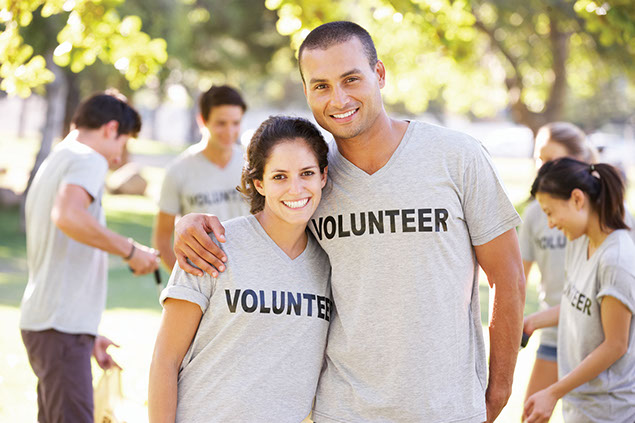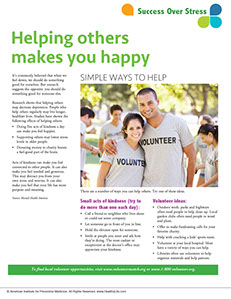SYMPTOM CHECKER
CONDITIONS
Male
Female
Child
Arm, Hand & Shoulder Concerns
Legs & Feet Concerns
Dental & Mouth Concerns
Ear & Nose
Eye Conditions
Head Conditions
Arm, Hand & Shoulder Concerns
Legs & Feet Concerns
Front
Back
Arm, Hand & Shoulder Concerns
Dental & Mouth Concerns
Ear & Nose
Eye Conditions
Head Conditions
Arm, Hand & Shoulder Concerns
Dental & Mouth Concerns
Ear & Nose
Eye Conditions
Head Conditions
Front
Back
Arm, Hand & Shoulder Concerns
Neck Links
Head & Neck Concerns
Arm, Hand & Shoulder Concerns
Neck Links
Head & Neck Concerns
Front
Back
Online Clinic
Wise Healthcare
Helping others makes you happy
Print on Demand
It’s commonly believed that when we feel down, we should do something good for ourselves. But research suggests the opposite: you should do something good for someone else.
Research shows that helping others may decrease depression. People who help others regularly may live longer, healthier lives. Studies have shown the following effects of helping others:
• Doing five acts of kindness a day can make you feel happier.
• Supporting others may lower stress levels in older people.
• Donating money to charity boosts a feel-good part of the brain.
Acts of kindness can make you feel connected to other people. It can also make you feel needed and generous. This may distract you from your own stress and worries. It can also make you feel that your life has more purpose and meaning.
Source: Mental Health America
Simple ways to help
There are a number of ways you can help others. Try one of these ideas.
Small acts of kindness (try to do more than one each day):
• Call a friend or neighbor who lives alone or could use some company.
• Let someone go in front of you in line.
• Hold the elevator open for someone.
• Smile at people you meet and ask how they’re doing. The store cashier or receptionist at the doctor’s office may appreciate your kindness.
Volunteer ideas:
• Outdoor work: parks and highways often need people to help clean up. Local garden clubs often need people to weed and plant.
• Offer to make fundraising calls for your favorite charity.
• Help with coaching a kids’ sports team.
• Volunteer at your local hospital. Most have a variety of ways you can help.
• Libraries often use volunteers to help organize materials and help patrons.
To find local volunteer opportunities, visit www.volunteermatch.org or www.1-800-volunteer.org.
This website is not meant to substitute for expert medical advice or treatment. Follow your doctor’s or health care provider’s advice if it differs from what is given in this guide.
The American Institute for Preventive Medicine (AIPM) is not responsible for the availability or content of external sites, nor does AIPM endorse them. Also, it is the responsibility of the user to examine the copyright and licensing restrictions of external pages and to secure all necessary permission.
The content on this website is proprietary. You may not modify, copy, reproduce, republish, upload, post, transmit, or distribute, in any manner, the material on the website without the written permission of AIPM.
2021 © American Institute for Preventive Medicine - All Rights Reserved. Disclaimer | www.HealthyLife.com

















































